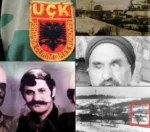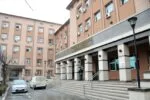The Serbian-language portal “Kossev” published an interview with the British Ambassador to Kosovo, Jonathan Hargreaves. According to Kossev, the interview was conducted earlier in the week, before the action that took place on Friday in the North.
Hargreaves stated that it is clear to him that Kosovo has a clear vision of becoming a modern, democratic, multi-ethnic, and European state. “We will do everything we can to support this and promote peace and stability in the region. However, this will not be achieved until all aspects of the Basic Agreement and the Ohrid Agreement are implemented by both Kosovo and Serbia. It is deeply disappointing that the negotiations are currently blocked.”
He also discussed the government’s decisions to ban the dinar and close Serbian post office branches and savings banks.
“Whether it’s about the dinar or the closure of Serbian Post Office branches and Savings Banks, I joined the international community in urging the Prime Minister to ensure that his government undertakes such measures in coordination with us and local communities, so that they are implemented in a way that protects those who need to be protected,” he said.
On the other hand, Hargreaves mentioned that the billing of electricity, license plates, and driver’s licenses are successful steps.
“As for the Government of Kosovo’s policy towards the Serbian community in Kosovo, it is important to highlight some of the steps that have been successful, such as solving the electricity billing issue, implementing the agreement on license plates, and converting driver’s licenses,” he said.
“It is legitimate for the state of Kosovo to have such expectations from its citizens across the country. The United Kingdom has done everything it can to help where it sees the Government of Kosovo taking positive steps, whether through our work on diploma verification or supporting a multilingual online information platform that helps all non-majority communities engage with state institutions, or by helping efforts to make communication in Serbian more effective.”
Hargreaves stated that it is extremely important for Milan Radojičić and others involved to be held accountable for the attack in Banjskë.
The ambassador was also asked about the visit of CIA chief William Burns.
“I think you should ask this question to one of the many analysts in Kosovo. I cannot speak on behalf of my American colleagues, but from my perspective, the US is consistent in its commitment to the security and stability of Kosovo and the entire Western Balkans region, and I do not see that changing.”
Kossev asked Ambassador Hargreaves if he sees discrimination against Serbs in Kosovo.
“I have visited the northern parts of Kosovo several times since I arrived here. I have made it a priority because I want to maintain regular dialogue with people here and understand the real situation on the ground as much as possible. Northern Kosovo is beautiful, with a rich history and great economic potential, but the people living here are still paying a high price for the lack of normalization between Kosovo and Serbia.”
He added that Serbs in the north feel profound insecurity and lack trust in the governments in Kosovo and Serbia regarding their concerns.
Hargreaves said he is sorry that Serbs, at the request of the Serbian List, boycotted the opportunities to be democratically represented in the petition organized this year to remove the Albanian mayors there.
“If I had to sum up my impressions from talking to the local Serbian population in Kosovo in one sentence, it would be that many people feel profound insecurity and often do not trust the ability of the governments in Pristina and Belgrade to listen to their concerns. I have the impression that many Serbs in Kosovo feel that their interests are almost entirely absent from political representation or citizen voices. It is very regrettable that the majority of the Serbian population in Kosovo, at the request of the Serbian List, boycotted the last opportunities to be democratically represented.”







